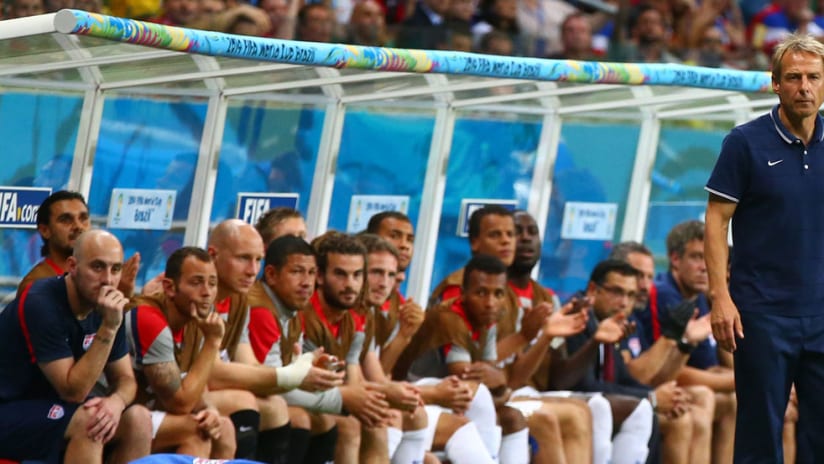CARSON, Calif. – Collegiate soccer is an integral part of player development in the United States, says Jurgen Klinsmann, who is fully behind proposals that will be presented to an NCAA committee this spring with the aim of transforming the college game.
The US national team coach on Wednesday said recommendations by college coaches to switch from a heavily compacted four-month fall schedule to a season that would cover the entire school year, among other changes, is vital if American soccer is going to catch up with the game in Europe and South America.
“As a developmental piece, [college soccer is] hugely important because it's part of the American infrastructure since always,” Klinsmann said from the USMNT’s January camp at StubHub Center. “It has a tremendous value to all sports, development through college into the professional game. The specific problems in the soccer field is that a soccer schedule is 11 months, loaded with games throughout 11 months and X amount of training sessions.
“It's all basically driven by the pro game in Europe and South America. So these are the highest standards, so based on these standards, we're trying to catch up.”
MLS has steadily expanded over its 20 seasons from a six-month schedule to one now covering nearly 11 months, including preseason preparations, but the college game extends from late August through the Division I championship game in mid-December, with teams often playing two and three games in a week and less often than 48 hours between matches.
Coaches are heavily restricted in working with their teams out of season, and many of the rules – especially regarding substitutions – fail to adequately prepare players for the professional game.
A group of coaches led by Maryland's Sasho Cirovski, who has won two national titles and reached the College Cup final four eight times in 23 seasons with the Terrapins, has concocted proposals to establish a fall-spring calendar and extinguish NCAA limitations so that match and training regimens can mirror those used around the world.
Former Houston Dynamo president Oliver Luck, now the NCAA's executive vice president for regulatory affairs, has been a keen ally as the coaches prepare to make a presentation sometime this spring to the NCAA's new Division I Competition Oversight Committee, which is chaired by University of Kentucky athletic director Mitch Barnhart.
The German-born Klinsmann, one of the finest strikers of his generation, says he's been involved “on a technical side” with the coaches in creating the proposals.
“I regularly talk to a whole group of college coaches. We have conference calls. They help us identifying [prospective] Olympic team players ...,” Klinsmann said. “For the kids to go on a consistent 11-month season is really, really difficult, and that's why we need to figure out those infrastructural issues we have.”
The length of schedule is most vital.
“The biggest problem we have with the college season always is that it's not long enough. It's not demanding enough. It's too much regulated by other kind of ideas,” Klinsmann said. “You don't regulate training sessions with X amount of gym sessions – gym is not a soccer session. All that stuff needs to, hopefully down the road, go away, and we have some people make the right decisions with the soccer infrastructure in the college system that gives them the highest chance to make it into the pro game.
“Because all of the college kids dream about [becoming a pro]. If you have only five or six months [to play in college, including an abbreviated spring training season], it's very difficult. Even if you get picked [in the MLS SuperDraft], even then it makes it very difficult for them to break through. Very few break through right away because they cannot keep up with the tempo, with the demand of the professional game, because they are not prepared for that speed. You know, speed of play, speed of thought, physical speed and all that stuff.”
Klinsmann's son, Jonathan, was a freshman goalkeeper at the University of California last fall, and the US coach said his son's experience “definitely helps me to understand the college world.”
“If you have your own kid involved in it, it opens [your] eyes, what's going on there,” he said. “He's thrilled to be there. He's very, very happy. It's a very demanding school, so I understand also what's the workload on these kids from the academic side and how they manage then the athletic side. It definitely helps me to get a better picture.”
Klinsmann says monitoring other college players, especially national-teamer Jordan Morris during his time at Stanford, also provided great insight. He says Morris – training at Werder Bremen after announcing he's going pro following his junior season, when he led the Cardinal to the NCAA title – “definitely” developed in the college game.
“I think he so far made every right decision, absolutely,” Klinsmann said.
The college sports system is unlike any elsewhere on the planet – it serves as de facto minor leagues in several sports. Klinsmann is fine with that for soccer, as long as college soccer can truly serve that purpose.
“When you live in this country, you automatically will be part of some sort of college discussions because it's just so deeply in your roots, in your culture, which I think is wonderful,” he said. “In order to help the soccer-specific issues, we need to find ways to solve them.”
Cirovksi has estimated 85 percent of college coaches are behind the proposals. Klinsmann says it's important to get the word out.
“We're slowly making progress, but we still have a way to go,” he said. “Every article – telling you the truth – will help. Every media reaction will help because it's fundamental to have a college system that feeds to professional game here in the United States.”













